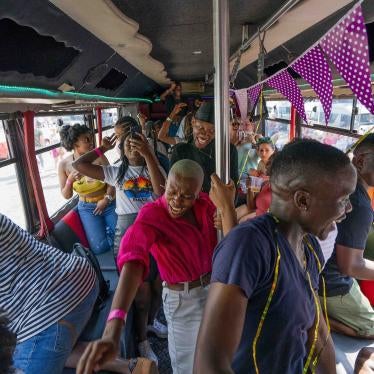Human Rights Watch welcomes the High Commissioner's update on Sri Lanka. We regret that senior officials in the Sri Lankan government have rejected the 2014 Human Rights Council resolution asking the Office of the High Commissioner for Human Rights (OHCHR) to independently investigate allegations of serious violations of human rights and the laws of war by both sides during Sri Lanka’s civil war, in light of Sri Lanka's failure to do so. The resolution also reiterated calls for domestic investigations and accountability mechanisms to be put in place.
As noted in the High Commissioner’s report, the Sri Lankan government has said that it will deny visas to OHCHR investigators. This does a great disservice to the many civilians and their families who were victims of abuses by both sides during the civil war and puts the government’s own credibility on these matters in a poor light.
Particularly concerning are government efforts to prevent victims and human rights advocates from providing information to the investigation. Pro-government media has deemed such witnesses to be traitors who want to betray their country, creating a climate of fear and intimidation.
The repression of rights activists and journalists has continued. Several prominent human rights lawyers have reported threats. Harassment on journalists is particularly intense in the ethnic Tamil-dominated north and east. The government has also ordered a ban on several overseas Tamil groups and individuals. Pledges to address the concerns of the Tamil population to protect minority rights remain largely unfulfilled. The government has continued to prohibit simple gestures, such as allowing Tamil communities to hold commemorative services for their dead, or to sing the national anthem in Tamil.
We are concerned about recent incitement and attacks against religious minorities in which the government has been slow to intervene. An attack on Muslims led by an ultra-nationalist Buddhist group in the town of Aluthgama caused at least 4 deaths, nearly 80 injured, and numerous damage to Muslim properties.
It is very important for OHCHR to continue to monitor and report on the human rights situation in Sri Lanka and the government's failure to acknowledge, let alone address, the country’s serious rights issues.Member states and the Human Rights Council should scrutinize and act on any case of reprisal against those who cooperate with the OHCHR investigation. We urge the government of Sri Lanka to rethink its approach and cooperate fully with the OHCHR investigation, the best hope for justice for Sri Lanka’s war victims.
We welcome the OHCHR Interim report on South Sudan and share its concerns on the gravity of the situation on the ground and the urgent need for accountability for abuses committed by both parties to the conflict. In this regard, we urge the African Union Commission of Inquiry on South Sudan to make clear recommendations on the best ways and means to ensure fair and credible prosecutions for serious crimes. Because of the limited capacity and independence of South Sudan’s justice system, a purely domestic initiative is not viable initiative. The council should urge South Sudan to commit to needed international participation and expertise, consider establishing a hybrid judicial mechanism and accede to the Rome Statute. The council should clearly state that any peace agreement must exclude amnesties for perpetrators of crimes under international law. Finally, we are concerned that the Human Rights Division of UNMISS has not produced any public reporting since May 2014, including on a serious attacks on the UN compound in Bor. We urge it to fully implement clear requests made by the Human Rights Council and the Security Council to carry out regular public reporting on the human rights situation in the country and to fully support the AUCISS.







